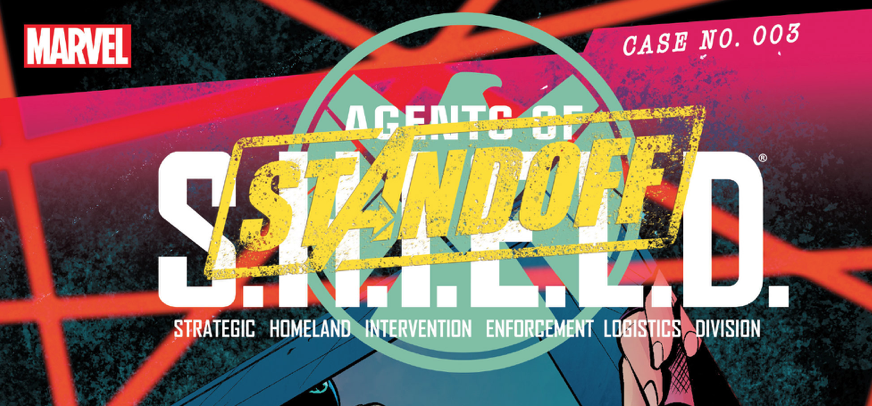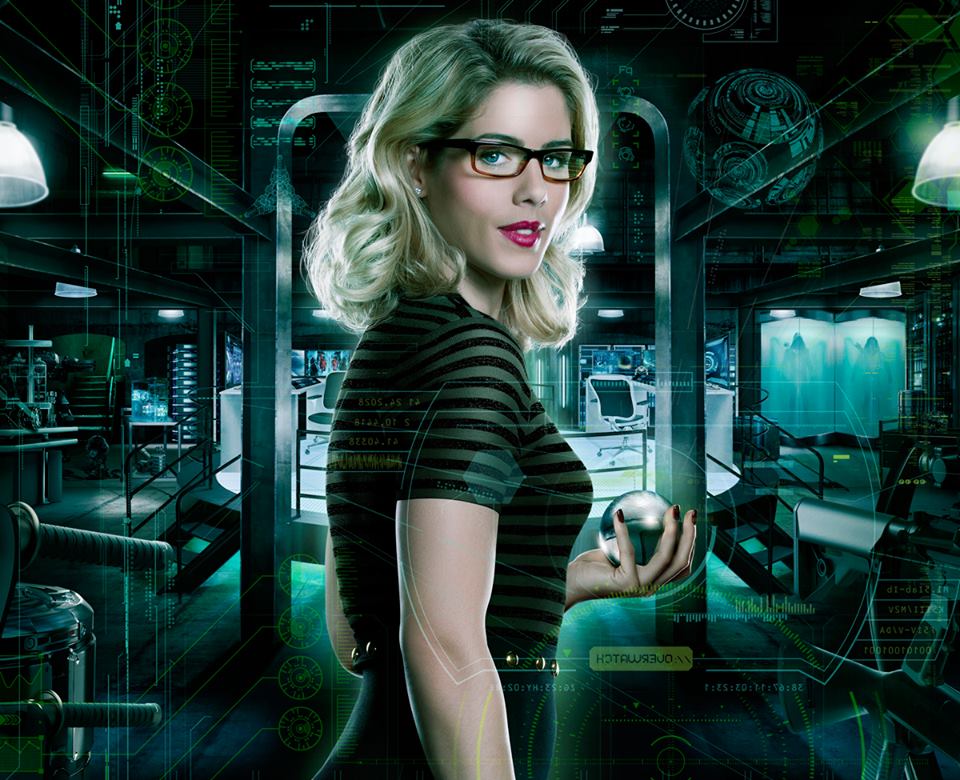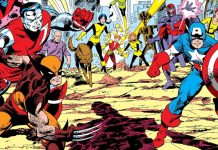Unlike the eponymous ABC TV show, Marvel’s new Agents of S.H.I.E.L.D. comic isn’t bound by budgets, cameos or contracts. Series writer and Arrow executive producer Marc Guggenheim is using that freedom to tell an expansive, grandiose story that seeks to transform the way you experience the Marvel Universe. Following a recent editorial, Comics Beat reporter Alexander Jones recently had the opportunity to sit down with Guggenheim and discuss the controversial choices he’s made on Arrow and how his method of world-building influences the choices he makes as he plots characters’ journeys in S.H.I.E.L.D..
Alex Jones: Let’s talk S.H.I.E.L.D., what is it like being able to tell a story with no budget attached?
Marc Guggenheim: It’s really great. Honestly, I think I work in comics for two reasons: one is that I love the medium and I love the characters but also, I love being able to tell stories without the restrictions of a budget or quite frankly a lot of the things that go along with writing for television. I just have a lot more creative freedom in comics in general that’s not just budgetary — it’s something that I’m creating really for the love the game.
Jones: How are you managing the cast of characters in this comic? It’s interesting, because it juxtaposes TV original characters with Marvel comics universe mainstays.
Guggenheim: That’s been actually a really big challenge from me– early on I sort of had to make a decision in my writing that I was going to be exploring the television versions of these characters. With Coulson, May, Fitz or even Simmons, or the comic book versions of them. I sort of took my path with Mark Waid’s run on S.H.I.E.L.D. — which followed Agents of S.H.I.E.L.D., the television series where Mark did a really great job blending the comics and television show. They felt like their comic book incarnations, but they didn’t feel completely out of the place.
Jones: Can you tease at all how your S.H.I.E.L.D. book fits into the tapestry of Pleasant Hill?
Guggenheim: You know, I can say that we’re actually going to tie into [the event] very deeply. If you are going to tie into an event, it’s has to feel like it’s not necessarily required reading, but also that there is a deep connection to the event that goes beyond just slapping the trade dress on the cover. When I heard the Standoff proposal, there were a couple different ways to tie-in Standoff, and I don’t want to spoil anything, but there’s other ways of tying into Standoff that don’t actually involve going into the town. We’re going to be integrating very closely with issues three and four of Standoff. We are going to be connecting with another Marvel book that isn’t the Standoff series proper in a very cool way. I think that’s where the price of admission is already there, I think we’re doing something that ties together another book in a way that in my mind hasn’t been done in like thirty years.
Jones: In a recent interview, Comic Book Resources questioned you about the state of HYDRA in the All-New All-Different Marvel universe. Can you tell us anything else about the villainous organization?
Guggenheim: Unfortunately, I can’t. We’re biding our time and recognizing that when Hydra does make its reemergence, it hopefully should be a big event for us. We want to do it in the right way and at the right time.
Jones: What is it like working with German Peralta? How do the two of you recreate the likeness and tone of the television cast when you immortalize them on the printed page?
Guggenheim: I have to say Katie Kubert, our editor, suggested German for this book and it was such a stroke of editorial genius in my opinion. German has this incredibly unique voice as an artist — his stuff is a little like Declan Shalvey but a little more suited to a book where likenesses are kind of important — I say kinda because German isn’t trying to capture the actress and actors likenesses perfectly. We aren’t doing an adaptation of Marvel’s Agents of S.H.I.E.L.D. — we are doing a Marvel comic book set in the Marvel print Universe adapted. I think he really found the right balance of making the characters evocative of their television versions, but they still feel like television characters. That’s a taller order than one might expect.
The other great part about German is that his storytelling is really good — he can give you the quiet moments and he can give you the bombastic panels. I always like to say that German classes up the joint, especially when paired with Rachelle (Rosenberg’s) amazing colors. The book has that sophisticated almost indie feel sometimes. This looks like the kind of book you expect Warren Ellis to write.
Jones: To switch gears, let’s talk about Arrow for a bit. In particular, I wanted to touch on Felicity, as she’s become something of a poster child for the way women are treated on Arrow.
Guggenheim: Absolutely! The idea to injure her in the middle of the year goes back to something we said in the beginning of season two: when you go through a crucible it makes you stronger. I think, hopefully, people are watching the show more for the evolution than the regression that came with earlier seasons.
Jones: Do you think the back end of Arrow season four has achieved the brighter tone teased earlier this year?
Guggenheim: You know, that’s a great question. It’s hard for me to say that a season that began with a grave and a mystery surrounding the identity of the body buried in it is significantly lighter than previous seasons of Arrow. However, one thing that we tried very hard to do this year is avoid the trope that we fell into in season three, where there was darkness but the way that the characters were responding to the darkness was also very dark.
I will give you an example and be very specific. If we had crippled Felicity in season three instead of this season, Felicity would have been crying and moping a lot. The aftermath would also be very dark. I don’t know if people have noticed, but the way that characters respond to darkness is different now. Bad things happen on this show — this is Arrow — but when bad things happen to our heroes, nowadays they respond in a much more positive way than they ever did in the past.
I also think our episodes this year have been some of the funniest we ever had. 4×07 was one of our funnier episodes. We’re actually editing 4×17 right now, which is bar none the funniest episode we’ve ever done in the show. We’ve always been honest with everyone. At the beginning of the year we talked about the lighter tone, but we always said: the show is never going to be The Flash. The Flash has its own tone in our little Arrowverse. Flash is Superman and Arrow is Batman. The biggest change we’ve made is that instead of responding to that darkness with more darkness in Arrow, we’re responding with some more hopeful lightness. At the flash forward at the grave, we’ve been very intentional in having Oliver say: “in the past I would have blamed myself.”
Jones: How did team Arrow decide to utilize the excellent Neal McDonough as the big bad of Arrow season four?
Guggenheim: Me, Wendy Mirecle, and Greg Berlanti wanted to cast McDonough last year but it didn’t work out for a variety of reasons. McDonough said that he wanted to bring “a little more Gene Hackman Lex Luthor” into this character. I’m like “oh, great…I mean sure!” We really pushed that more than we originally intended, but I’m more than happy as it really made the character so much fun to watch. Even with things like Neal’s wedding ring that Darhk wears on the show, Neal asked early on: “can Darhk wear my wedding ring?” We were like sure — and that got us thinking, so Darhk is married? Who is he married to? It has been a wonderful collaboration with Neal over the year.
Jones: I would be remiss with having you on the phone and not asking about Legends of Tomorrow’s Star City 2046, can you talk about it how it came together?
Guggenheim: I don’t think any episode of TV I’ve written had as much fanboy fulfillment as that one did — it was a blast to write. I had so much fun writing with Greg, Stephen was so game and it was just an episode where we got to do all these fun things. We got to reintroduced Deathstroke, introduce Grant Wilson and Connor Hawke and the incredibly costume design for the character. It wasn’t even about planning (it’s always difficult to juggle Stephen with two shows) it was just joy to write and a joy to produce. If my Twitter feed as any indication, it seemed like people were really enjoying the episode.










Point-of-fact: Marvel’s Agents of S.H.I.E.L.D. is an ABC show, not on NBC.
@ Andrew – depends what market u in. Affiliate stations in various markets can carry the show, in some parts of the country, Agents of SHIELD actually airs on Black Entertainment Television!
Comments are closed.